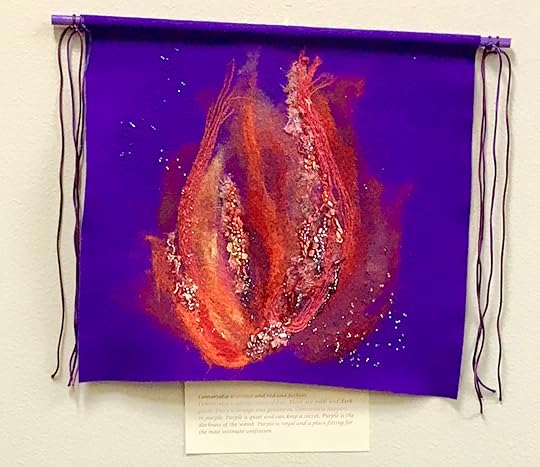Tracy Rittmueller's Blog, page 3
March 31, 2020
Invitation: Let's Walk Care-Fully THROUGH this Together
Entering April, 2020 with a global pandemic and social distancing, we are likely encountering uncertainty, anxiety, fear, perhaps even dread, all triggered by our past experience of suffering and sorrow. To get through this painful time, to come out on the other side with wisdom and resilience, we would be wise to deal with our pain and our fears during this time.
“There are two ways of dealing with suffering,” writes Almut Furchert, PhD.. “One is to give into despair. The other way is to give into the suffering, by noticing it, and by tenderly leaning into it…”
Of course, we could, and often do, deny our sorrows and fears, stuffing them into the shadows, masking them with schmarmy positivity (also known as toxic optimism). But that is like wrapping a gaping wound in sparkly ribbons and leaving it to fester, or like ignoring a virulent cancer while it proliferates, untreated.
To deal with the inevitable sorrow of being human, we have to acknowledge truth. Life is beautiful and joyful, but that coin has a flip side. Life is also painful and tragic. We experience hurt; we need comfort.
The only way out is through
Almut Furchert has been trained and degreed, at a German University graduate level, in psychology and psychotherapy. She holds a PhD in philosophy of religion, and is an internationally published scholar on Søren Kierkegaard. She reminds us that he wrote this in his comforting notes to the sufferer:
Though it might feel that your suffering
is going right through you,
it is you who goes through the suffering.
The path to sweet consolations, my friends, is through our pain. We need to visit our places of sorrow. We also need to guard against falling into despair, which is what happens when we get lost and mired in suffering. We are approaching Holy Week, a liturgical journey through suffering to new life. April 5-11 offers an opportune time to take an inward journey through the mystery of life. In this mystery we accompanied by great beauty and tender mercy, and suffering leads us into renewal.
I’m inviting you to join me (virtually) next week for a 6-day retreat featuring J.S. Bach’s glorious, musical masterpiece, the Passion of St. Matthew. You can choose to spend as little as 15 minutes daily, or any number of hours, meditating on an Aria, recitative or chorus from the passion, along with “some tender guidance” from our retreat facilitator (who is also my dear friend) Almut Furchert.
Bach’s Passion of St. Matthew Offers the Consolation of Divine Mercy
This online retreat, born of “sheltering in place,” and compassionately, skillfully facilitated by “Frau Doctor Almut,” will assist us as we tend to our sorrows in the presence of the Divine, consoling power of Bach’s Passion. Through Bach’s music, accompanied by Almut’s expertise in philosophy, which is the love of wisdom, we will seek comfort, healing, and resilience.
If this speaks to your heart, please join me in building a community of connection and comfort. Let’s create bonds where renewal and resilience can flourish. Let’s Walk THROUGH this beautiful, sacred time together. In compassionate, communal connection, the path of suffering and the path of love become the same path.
Let’s walk care-fully through this together: an invitation to participate in a consoling online retreat
Read more from Almut Furchert about what to expect from this life-affirming retreat.
Register for this online retreat, a gift from Almut Furchert, for all who need consolation in these troubled times.
Invitation: Let’s Walk Care-Fully THROUGH this Together
October 20, 2019
Poem: Healing is a Never Ending Departure
April 13, 2019
How to Fight Fear on Facebook
March 27, 2019
Let's Help Each Other Learn How to Ask For Help
For some years now, I’ve been connecting with people like you, who care about building a life around kindness, compassion, and the concept of enough. The people I like to hang out with, online and in person, believe that an obsession with fame and fortune—with what’s popular—blinds us to the essential aspects of a real life. Let’s build and strengthen authentic relationships, because real relationships are not about transactions. Real relationships are based on love.
Still here? Good. Thank you. I have a problem and I will value your input.
I don’t know how to ask for help. Do you?
If you know how to ask for help, please offer your tips and reflections, book suggestions, quotes, anything that will contribute to this conversation, in the comments below.
Only last night, I realized that not knowing how to ask for help has been my life long problem, my achilles heel. And now in midlife, I’m limping, getting nowhere fast, when I really, really need to be moving ahead.
I’m too self-reliant and I take too much responsibility–I wasn’t aware of this. But recently I’ve been learning to open my heart to others, to listen to their wisdom. It can be helpful to see ourselves through the eyes of those who love us. This is what I’ve heard from my dear ones in the last month alone:
After giving a presentation on Book of Transformations: Poetry, Spirituality, Love (a book I’m writing) for the Studium scholars and Sisters of Saint Benedict’s monastery, my friend Chuck Huff (a professor of Psychology and soon-to-be-published graduate-level textbook author), came up to me, hugged me, and said. That was a really clever line about your mask. How did you put it? I had said,
I can handle all this, if I just stay here behind my spiffy mask of optimistic competence.
Right, he said. And then he looked deeply into my eyes—the windows to my soul—and said something that possesses the power of a prayer,
It’s time to take off that mask.
I suppressed the urge to bawl like a baby. I don’t cry in public.
Two weeks later, enjoying a wonderful, long-overdue girlfriend chat with my lifelong friend, the poet/writer Susan Thurston, I relayed that story. And she said,
Yeah, you don’t do vulnerability.
Well, no, I don’t do vulnerability, because, egads, it opens you to more pain. I have plenty of that already, thank you very much.
And then, just last night, proud of all I have accomplished in the past years, said to my husband,
I don’t do that cry-baby ‘help me’ thing!
My dear husband, who, by the way, is ten years into the process of non-Alzheimer dementia and, miraculously, while losing cognitive power is also becoming wiser, said,
No. You do that ‘don’t help me’ thing.
Touché!
So, I’ve been looking at online articles this morning, and they’re all search engine optimized to get traffic to a website. I enter the phrase “how to ask for help” into a search engine, and I get sent to an article written by someone who doesn’t actually care to help me, but instead is a content writer paid to turn me into a commodity, a “like” or “hit” to help sell a product or advertising space. This means, the articles I found are mostly superficial and not actually helpful.
4 online articles about ‘how to ask for help’
A social psychologist explains how to ask for help without making it weird
 Photo on Visualhunt.com
Photo on Visualhunt.com
This social psychologist offers 8 Suggestions and a lot of words about ways NOT to ask for help.
Asking for help
 Photo on Visual Hunt
Photo on Visual Hunt
This nonprofit crisis support center equates asking for help with mental health crises like depression. Here are 3 bulleted lists with no elaborations: Barriers to Asking for Help; Benefits of Asking for Help; Where to Go to Get Help. Shallow!
How to ask for help and actually get it
 Photo on Visualhunt
Photo on Visualhunt
This New York Times article comes with the subtitle “People want to help you. You just have to ask.” And that’s pretty much everything the article says. It’s also hard to read the article–it’s so surrounded by ads!
How one company got its employees to speak up and ask for help
 Photo on Visualhunt.com
Photo on Visualhunt.com
And this article isn’t about how to ask for help at all, it’s a case study story about a company that figured out a way to provide better customer service and retain its customers, by making an environment where its employees are rewarded when they ask for help.
Why I need to ask for help
To support myself and my husband, while dealing with he intricate demands of being the primary caregiver to a spouse with dementia, I work as a strategic development and marketing consultant to nonprofit organizations, and small providers of integrative health care. I also take on free lance writing and editing assignments. Meanwhile, I’m working on completing a book, and now and then, a new poem.
To stay sane, I practice Benedictine spirituality, including prayer, reflective reading, silence, service, and stable commitment to my community. I am also devoted to my immediate family—parents, siblings, children, grandchildren and beloved friends. I turn down most new invitations and requests for my time, but I’m still feeling overwhelmed by too many tasks. Thanks to my role models and mentors, I’m actually doing a lot less now than I’ve ever done. All my life I had been doing way, way, way, way, way too much. When I started “tidying up” my life commitments, I had no idea how much clutter I had.
I have been a commitment-hoarder!
I feel overly responsible for getting things done, and done right, and I know that. I need help.
Why it is difficult for me to ask for help
I still am carrying quite a few commitments that haven’t been cleared away, because I don’t feel it’s responsible to just dump them like an oil spill into the river of our interconnected lives. I’m trying to cart them away to a safe place, where there will be minimal damage when I unload them.
Yeah, that’s a smoke screen isn’t it?
But asking for help is like ripping off a bandage that has been there a long, long time. I’m afraid to do it. I’m afraid to see what’s underneath. Would you please do it for me? I just close my eyes and on the count of three . . .
Tell me how to ask for help
Tell me (in the comments below, or via this form that goes directly to my private email) why it’s so difficult to ask for help and how to do it. I’m listening.
According to the experts, I’m doing my blog all wrong. I’m not remotely concerned with what’s popular. I care about what’s meaningful and good in life. If you read this far, a meaningful life must mattes to you, also. Thank you for being here. Your presence blesses me, and this small community of spiritual seekers and book lovers.
Let’s Help Each Other Learn How to Ask For Help
February 20, 2019
How 3 months at a Benedictine monastery set me free from the time-pressure paradox
January 28, 2019
Envision Benedictine Listening (Obedience) through Visio Divina (Divine Seeing)
January 20, 2019
Envision Benedictine Stability through Visio Divina (Divine Seeing)
January 14, 2019
Envision Benedictine "conversatio morum" though Visio Divina (Divine Seeing)
Professed Benedictine monastics formally promise to uphold a 3-fold commitment to listening (obedience), stability, and fidelity (conversatio morum) while living within their communities. Oblates (lay associates) strive to apply these principles while living “in the world” outside the monastery. We believe all can benefit from incorporating the timeless wisdom of The Rule of Benedict into their lives.
The Benedictine Promise of Fidelity to Growth (conversatio morum)
“Conversatio” Fiber Art by Pat Picket
Conversatio Morum, Brother Ignacio Gonzales writes, “is an act of the will that says, ‘I want my life to change’. . . [I want to go ever] deeper in my prayer life so that I might grow more open to my true self.” It is, essentially, a commitment to the ongoing process of transformation that leads to increasing wisdom, with an increased capacity to love God, ourselves, and others as ourselves.
About this piece, the artist writes: Conversatio sparked the desire to turn around, to turn, to turn around, to turn, to return, to turn and turn again. So, while it starts out small, it could eventually become a consuming fire that doesn’t burn but sets one clearly in the heart of God – more and more as one turns. There have been times when I have turned away from God. I didn’t want any part of God. I believed God wasn’t fair, wasn’t as loving as everyone said. Then, there were times I just wanted to do what I wanted to do. It was that spark, that little fire that never went out that kept luring me back, luring me to turn to God again . . . Conversatio is orange and red and fuchsia. Conversatio is all the colors of fire. There are golds and dark plum. There is orange and goldenrod. But Conversatio happens in purple. Purple is quiet and can keep a secret. Purple is the darkness of the womb. Purple is royal and a place fitting for the most intimate confession.
How to Practice Visio Divina
Close your eyes and clear your mind.
Open your eyes and “read” the whole image. Close your eyes and rest.
Meditate on the image, let your eyes be drawn to one part of the image. Name this part.
Close your eyes and see that part of the image in your mind.
Open your eyes and look at that part of the image; notice your response — a word, another image, an emotion.
Close your eyes and rest.
Open your eyes and look at the whole image. What is speaking to you? How will you respond to this?
Fiber Art Wall Hangings by Pat Picket are located at Saint Benedict’s Monastery. Photos by Tracy Rittmueller with permission to publish on this blog.
Envision a self-story in which you value lifelong spiritual growth
Using Timothy Wilson’s story-editing technique from his book Redirect.
You might journal about why change and growth are challenging or why you resist changes that will lead to spiritual growth. Are you afraid of God? Angry? Do you worry about what you will have to give up in order to be closer to God? Do you think God doesn’t want a relationship with you? Why and how is a commitment to lifelong growth in God difficult for you?
See yourself as a person who believes in the value of a deeper relationship with God. Consider, and perhaps journal, about why it is good to seek God, to spend time in God’s presence, to trust in the process of spiritual growth. Consider how wisdom increases with experience and age. Think and/or write about yourself as a person who is, or could be, growing in wisdom and in the ability to show love.
Ask God to help you grow in wisdom and become more loving.
Now relax and let your growth in wisdom and love happen organically over time, by the opportunities and graces given to you, trusting that increasing wisdom and love will also grow peace in your heart, your life and the lives of those around you. May your spiritual growth bring more peace to our world.
Comment?
The artist, Pat Picket, has earned Master of Divinity and Divinity of Ministry degrees from Colgate Rochester Divinity School, a Master of Religious Education degree from University of San Diego, and a Bachelor of Arts degree from Metro State Denver. She is also an oblate of Saint Benedict’s Monastery in St. Joseph, Minnesota.



